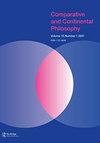The Sea Both Giveth and Taketh Away: Hölderlin and Coetzee on the Philosophical Essence of the Refugee
IF 0.3
0 PHILOSOPHY
引用次数: 0
Abstract
ABSTRACT Arguing that the seafarers in Hölderlin’s late hymn “Remembrance” are ambiguous, as they keep slipping between the figure of the merchant and the refugee, this paper juxtaposes how the ambiguous seafarers in Hölderlin’s poem and the protagonists in Coetzee’s The Childhood of Jesus, who are all refugees, relate to the sea. This juxtaposition allows us to arrive at a philosophical distillation of the existence of the refugee, who, caught between the competing injunctions to forget and to remember, represents the entire gamut of human existence. Coetzee’s novel complements Hölderlin’s poem by showing us that the refugee, in facing existential dilemmas that pertain to the very ground of all morality, is not to be seen as a victim or an eternal object of pity, but as a figure exhibiting a sovereignty of incomparable magnitude.给予与索取的大海:霍尔德林与库切论难民的哲学本质
本文章由计算机程序翻译,如有差异,请以英文原文为准。
求助全文
约1分钟内获得全文
求助全文

 求助内容:
求助内容: 应助结果提醒方式:
应助结果提醒方式:


